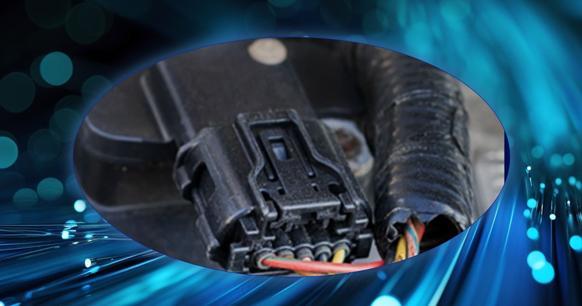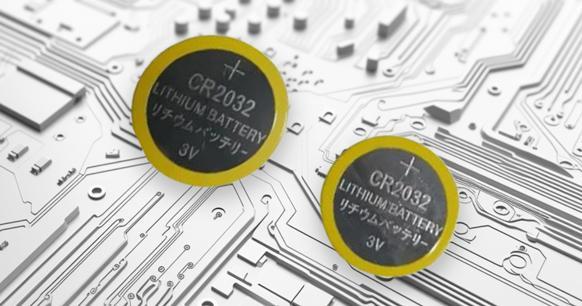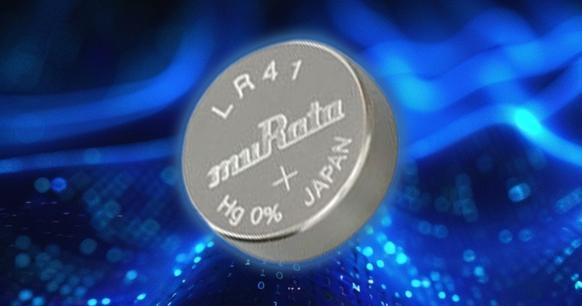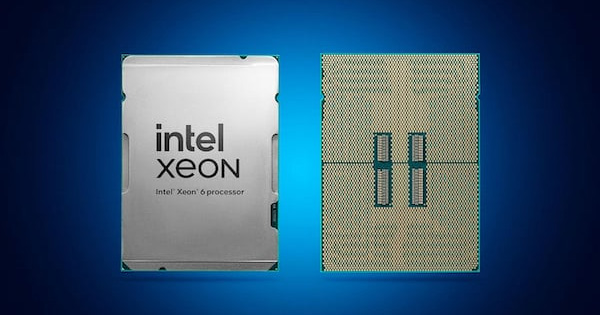
Automotive Passives Roundup: Small Size Doesn’t Equal Small Performance
As modern vehicles integrate more electronics for electrification, advanced driver assistance systems (ADAS), and high-speed connectivity, the demand for compact, reliable, and high-performance components continues to rise. Engineers face increasing pressure to optimize space, improve power efficiency, and ensure durability under extreme conditions.
Leading component manufacturers are responding with innovations in resistors, diodes, inductors, and capacitors designed to meet these evolving requirements.
Rohm’s Compact Resistor Family
Rohm Semiconductor recently released its MCRx chip resistor family to support the growing need for miniaturization and higher power density in automotive electronics. These resistors address space constraints in electric vehicles (EVs), ADAS, and other high-density applications by reducing the component size without sacrificing power handling.
The MCRS series reportedly offers up to 50% size reduction while maintaining equivalent power ratings, while the MCRL series provides ultra-low resistance options for high-accuracy current sensing. Rohm claims both variants operate reliably under extreme conditions, including 155°C temperatures and automotive-grade mechanical stresses.
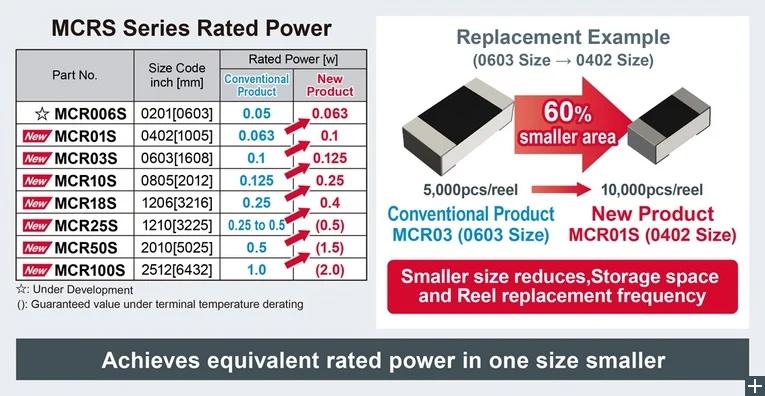
The MCRS series rated power. Image used courtesy of Rohm Semiconductor
Key specifications include package sizes as small as 1.0 mm × 0.5 mm, power ratings up to 2.0 W, and resistance values from 1 mΩ to 10 mΩ. The resistors meet AEC-Q200 standards, withstand thermal cycling, and maintain stable resistance over time. Applications include battery management, radar/LiDAR modules, and high-power switching circuits.
Littelfuse's TVS Diodes for EV Battery Systems
Littelfuse built its new TPSMB-L series automotive TVS diodes to protect high-voltage electric vehicle (EV) battery systems from transient voltage spikes. As EV architectures transition to 800-V platforms, the risk of damaging transients increases. These diodes mitigate this risk by clamping surges to ultra-low voltage levels, with models like the TPSMB75A-L limiting transients to 96 V under 10/1000-μs conditions. Their high peak pulse power dissipation (600 W) and fast response time (<1 ns) provide critical protection for battery management ICs, analog front-end chips, and traction inverters.
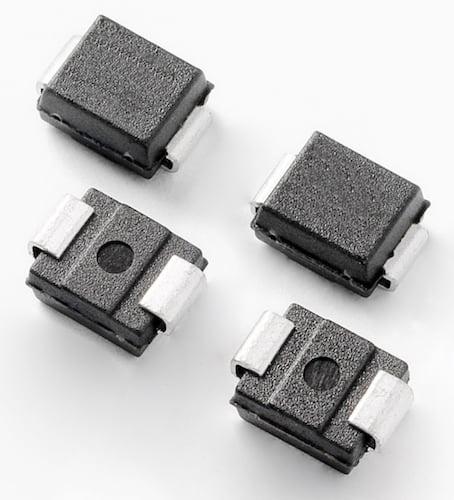
Littelfuse’s TPSMB-L series automotive TVS diodes. Image used courtesy of Littelfuse
Packaged in a compact SMB (DO-214AA) form factor, the TPSMB-L series offers a low thermal resistance of 20°C/W and operates reliably in -65°C to +175°C environments. They comply with AEC-Q101 standards, undergo extensive thermal shock and mechanical stress testing, and support ASIL-D safety requirements. With a failure mode that triggers fault detection in battery management systems, they enhance long-term system reliability.
High-Current Inductors for Automotive Power-Over-Coax
TDK has developed its ADL4532VK series of wire-wound inductors to enhance power-over-coax (PoC) technology in automotive applications, particularly for advanced driver-assistance systems. These components allow simultaneous power and data transmission over a single coaxial cable, reducing wiring complexity, vehicle weight, and assembly costs. With current ratings of up to 1,650 mA and an operating range from -55°C to +155°C, the inductors can withstand high-heat environments like under-hood or exterior-mounted ADAS modules. Their high impedance across tens to hundreds of megahertz ensures effective signal isolation, supporting reliable high-speed data transmission.
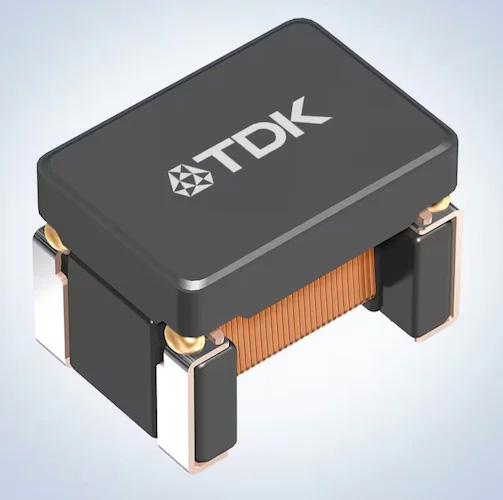
Representation of the ADL4532VK series of wire-wound inductors. Image used courtesy of TDK
Available in three inductance variants (3.0 μH, 10 μH, and 16 μH), the ADL4532VK series offers low DC resistance and high saturation currents, maintaining efficiency in compact camera and sensor modules. The AEC-Q200-qualified inductors resist thermal shock, vibration, and humidity, making them suitable for demanding automotive conditions. By reducing PCB footprint by up to 30%, they help optimize space in dense electronic control units (ECUs).
Würth's Vibration-Resistant Capacitors
Würth Elektronik claims its new vibration-resistant capacitors improve the mechanical durability of automotive electronics, addressing issues caused by continuous road vibrations and shocks. These components strengthen PCB bonding through enlarged solder pads, use reinforced base plates to dampen resonant frequencies, and incorporate strategic cutouts to maintain thermal dissipation. Würth says the capacitors can withstand 30-g acceleration forces, exceeding standard automotive vibration requirements by 200%. This may qualify them for engine control units (ECUs), power electronics, and sensor modules.
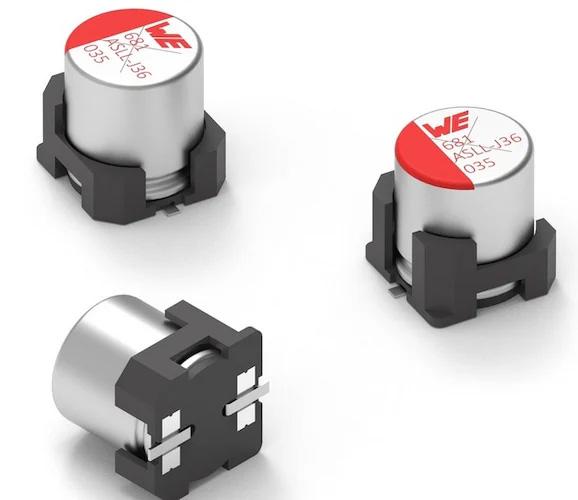
Würth Elektronik’s WCAL-ASLI vibration-resistant capacitors. Image used courtesy of Würth Elektronik
The WCAP-ASLI series offers capacitance values from 10 µF to 6,800 µF, voltage ratings up to 63-V DC, and low impedance for stable operation. They comply with IEC 60384-4 and AEC-Q200 standards, ensuring reliability under extreme conditions (-55°C to +105°C) with a 50,000-hour MTBF. Key applications include stabilizing EV powertrains, maintaining signal integrity for in-vehicle networking, and improving ADAS sensor calibration.
Stackpole's High-Voltage, Thin-Film Resistors
Stackpole Electronics’ RNCV series thin-film resistors provide high-voltage stability and environmental resilience for modern automotive applications, including electric vehicles (EVs) and ADAS. With a low voltage coefficient of resistance (<1.5 ppm/V), these resistors maintain accuracy even at 1,000 V, making them useful for battery management and high-voltage monitoring. Anti-sulfur construction prevents corrosion in harsh environments, while temperature cycling endurance (-55°C to +155°C) ensures long-term reliability in demanding automotive conditions.
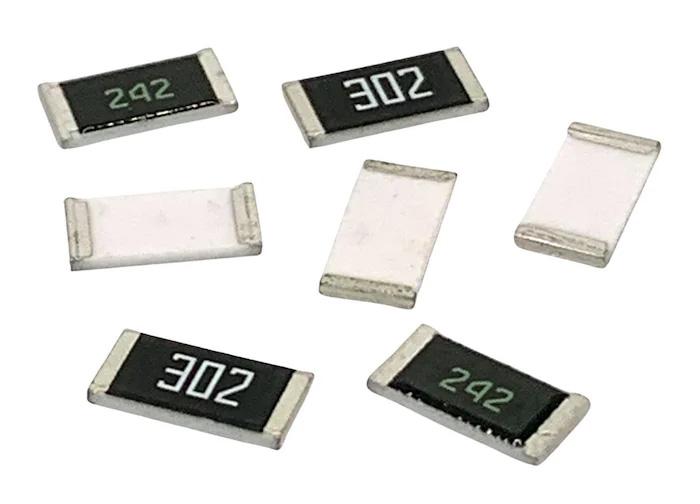
Stackpole’s RNCV series thin-film resistors. Image used courtesy of Stackpole Electronics
Available in 0805, 1206, and 1210 packages, the RNCV series offers resistance values from 160 kΩ to 3.01 mΩ with tolerances as low as ±0.1%. Their 1,000-V continuous working voltage, 1,400-V surge handling, and <0.05% resistance drift over 1,000 hours meet stringent industry reliability expectations. AEC-Q200 qualification and compliance with automotive vibration and shock standards make these resistors suitable for applications like Li-ion battery voltage sensing, ADAS camera circuits, and high-speed CAN-FD networks.

